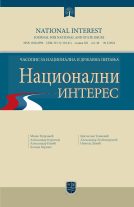- Home page
- Researchers
- Dejan Mihajlović
Dejan Mihajlović

THE POTENTIAL OF THE ANTI-HEGEMONIC COALITION
The authors consider the potential of a loose coalition in curbing US global influence, ie. the implications of its formation and strengthening on the final establishment of multipolarity. Based on the view that international relations are increasingly defined by multipolarity and that the opposition is increasingly speaking out against yesterday's hegemon, the authors point out that the US insists on an increasingly harsh global polarization, while Russia and China strive to initiate global “de-dollarization” mechanisms. The joining of African and Middle Eastern countries to the anti-American bloc initiates international processes that potentially lead to the strengthening of existing and the formation of new units of collective security. After a period of soft balancing of US power, in the period from the coming to power of the Putin administration until the conflict in Georgia in 2008, the Russian Federation began an era of hard balancing, and the conflicts in Syria and the current one in Ukraine are the best indicators. By intervening in Syria, Russia secured the supply of its own gas to Europe and regained its international reputation, while by launching military operations in Ukraine, it rejected immediate military threats to NATO from its borders. The balance of power is currently emerging as the most realistic concept of international relations, although Russia and China are waiting for the moment when the inevitability of economic growth will change the balance of power in their favor.

MILITARY FORCE AND POLITICAL POWER
Karl von Kllauzevic has determined that „war is a continuation of politics by other means“, but every war ends with politics. Therefore, in these lines, it is also worth mentioning that peace is achieved through the use of military force, and that the rhetoric of diplomacy has its own other side, which is a sword in the form of a determined and powerful military force. It is, in fact, that a respectable military force is the best deterrent to any attempt at destabilization and aggression, but also the factor determining the place and role of the state in the international order. Behind every serious diplomatic performance stands a determined military force ready to support it and thus show the power of diplomacy and contribute to the reputation of the state. The relationship between politics and the military is, in fact, the relationship between soldiers and citizens, the army and society as a whole. The extent to which there is mutual understanding, support and well-organized mechanisms of functioning is so much success in the joint appearance and unity of military power and politics. The mutual understanding of the army and society, that is, politicians and soldiers, is best reflected in the design of military budgets and the construction and development of the armed forces. If a budgetary and defense policy and the security challenges, risks and threats of a time period are put in place, then the civilian, political accountability towards the military factor, as well as to the state and the nation at a given moment, is assessed and determined in the best way. The ability to govern has two sides and relates to internal governance within a state and outside which develops within the limits of the laws of international relations. In such conditions, quantum of power is often an indicator that dictates the strength and degree of action of a particular state on the international scene and has changed during the development of human society. It used to be the production of iron and steel, then the number of horses owned by the army, so that the development of humanity eventually became sources of energy in general, the economic potential, as well as the technical and technological equipment of the military force. From a contemporary perspective, determining political power includes elements of social power, such as: population, territory, economic power, but also three distinct elements: military power, political system and ideology. We must not forget that the conduct of armed conflicts, or wars, is considered the main process by which the political power of states can be demonstrated and increased. In this way, the military power as a part of political power is connected with other factors of political power: economy, population and territory, because armed conflicts are causally and consequently intertwined with these elements. Also, in support of the previous statement, the fact that the military force can and does not have to be proportionate to the social power as a whole, and a society that does not have great social power can gain great military power if it directs most of its economy in the direction of strengthening the military force. Military power, on the other hand, does not have to be proportional to political power, because the effectiveness of the military force depends on other factors, such as the motivation of the population for defense, the fighting spirit, the traditional commitment to the defense of the state ....etc. The army and society with all their elements represent an indivisible whole, which is based on different mutually conditioned relations, so political and military power are in direct relation and interdependence one from the other. Their consistency is often presented as a guarantor of the prosperity of society and certainly contributes to the stability of the state both in terms of security and in the smooth development of quality of life.
